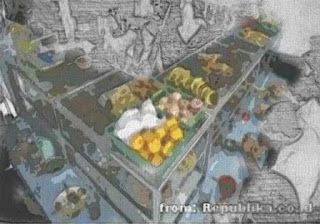The bag-pack visitors staying in Jakarta can live with less than US$ 15 (Rp 9,000 per US$) per day if they are willing to lodge in the modest inns similar to those at Jalan Jaksa, a foreigners’ favorite small street just around one mile south of National Monument, and dine at the food stalls scattering in Jakarta.
The food stalls are coined “warung Tegal” (Warteg) as most of the stalls are managed by talented people from Tegal (north coast of Central Java) for such small sidewalk gastronomic businesses that provide meals at affordable prices (less than US$ 2). The name has become generic as it is applicable to all similar food stalls of different tastes and menus regardless of the origin of the owners.
Most of the staple diets are generally simple composing of a piece of meat, soya bean cakes (tahu and tempe), vegetables, and of course a plate of rice. Fried rice and instant noodles almost always can be found, some serve kinds of dry foods, such as satay and curries. They serve snacks as well as fried bananas and typical drinks of Tegal clay pot tea. As for the customers, they should be selective and careful to observe the hygiene and cleanliness of the food stall.
Warteg is usually operated in rotations among family members every 3 to 4 months. Most of them usually do farming in their hometown while waiting for their turns. Today there are around 27,000 food stalls with the daily gross-income of a minimum of around Rp 400 thousand to survive. Most of the owners just rent small rooms or take an open space along the sidewalks. The food stall owners are usually incorporated in a Warteg Cooperative.
Some prospective Warteg owners obtain quite large income, which is apparent from their luxury homes built in their home town. It was the reason why the city government planned to tax them up for those who have the annual income minimum of Rp 60 million which has got the Jakarta House members’ endorsement.
The 10% food stall tax would certainly increase the food price which affects a lot of low-wage workers who frequently dine at the warteg. Another reason was that the food stall business is an informal one so no financial book-keeping is available and the buyers just pay in cash without getting a receipt of payment.
One of the observers on the public policy said that what the city government should do is intensifying the restaurant tax which has the potential to increase by hundreds billion rupiahs and aiding instead the small food stalls for their financial shortcomings (under the responsibility of Cooperative and Small & Medium Scale Business Ministry).
The good news came at last as the governor agreed to postpone the bill signing upon the request of the Association of Tegal Community in Jakarta because of the potential problems which might arise from such policy, bearing in mind that the food stall owners still have the obligation to pay the income tax whether in Jakarta or in their home town.
The good news came at last as the governor agreed to postpone the bill signing upon the request of the Association of Tegal Community in Jakarta because of the potential problems which might arise from such policy, bearing in mind that the food stall owners still have the obligation to pay the income tax whether in Jakarta or in their home town.



No comments:
Post a Comment